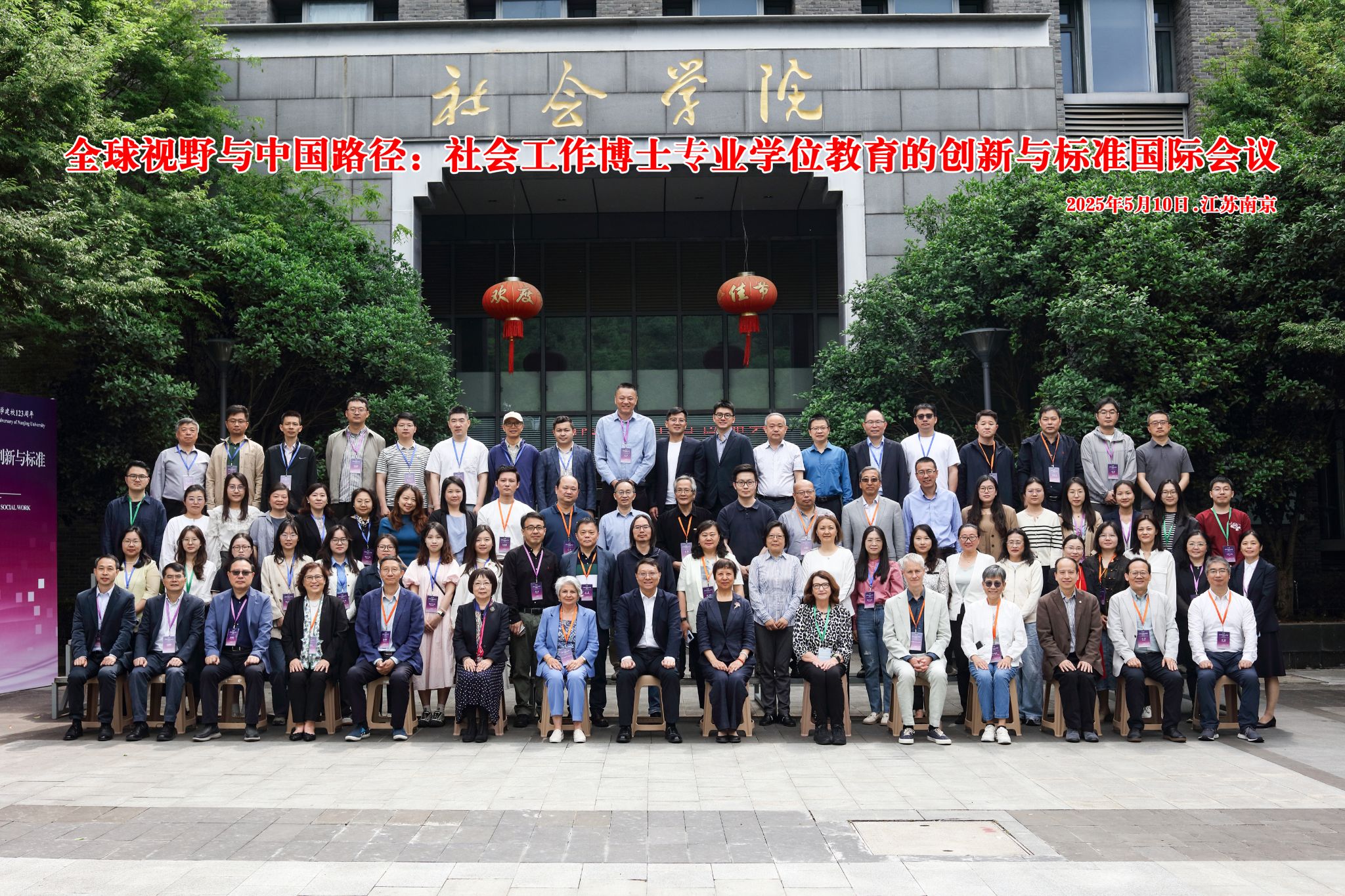- Members
- Global S W Docs
- Newsletter
- News
- Regions
- About Us
- Committees
From May 10 to 11, 2025, the International Conference on “Global Perspective and Chinese Path: Innovation and Standards in Doctoral Education for Social Work” was successfully held on Xianlin Campus of Nanjing University. Organized by the School of Social and Behavioral Sciences, the conference brought together over 30 distinguished scholars from China, the United States, the United Kingdom, Italy, New Zealand, South Africa, and Hong Kong SAR. Participants engaged in in-depth discussions on key topics such as international standards, localized practices, and institutional innovation. The event not only responded to global developments in social work education, but also marked a new phase for doctoral education in China that emphasizes both institutional building and quality advancement.

Advancing Innovation with a Global Vision
The opening ceremony featured remarks by Prof. Chen Yunsong, Vice Chair of the Nanjing University CPC Committee. He emphasized that doctoral education plays a pivotal role in cultivating high-level talent, and called for a doctoral education model that integrates international competence with local relevance, aiming to develop top-tier professionals rooted in China’s social realities. Prof. Antoinette Lombard, President of the International Association of Schools of Social Work (IASSW, online), and Prof. Ma Fengzhi, Vice-Chair of the National Steering Committee for Graduate Education in Social Work, delivered keynote messages highlighting the dual imperative of doctoral education: addressing urgent social challenges while advancing theoretical innovation.
The conference featured four keynote sessions focusing on: (1) core competencies in doctoral training, (2) bridging international standards and local development paths, (3) transforming knowledge production into practice, and (4) system-building and leadership development. Scholars including Prof. Darla Coffey (University of Pennsylvania), Dr. Shanea Thomas and Dr. Halaevalu Vakalahi (executives at CSWE, online), Prof. Jonathan Scourfield (Cardiff University), Prof. Elizabeth Beddoe (University of Auckland), and Prof. Annamaria Campanini (University of Milan-Bicocca) shared international insights drawn from the development of DSW (Doctor of Social Work) programs across Europe, North America, and Oceania.
Prof. Amy Yin-man Chow (The University of Hong Kong) and Prof. Eric Wing Hong Chui (The Hong Kong Polytechnic University) provided perspectives on integrating global frameworks with local practice in Hong Kong’s DSW programs. Meanwhile, Chinese scholars discussed how China’s DSW education can build on global experience while remaining anchored in national priorities and local governance needs. They called for a training model that serves strategic national goals, prioritizes practical innovation, and strengthens connections between research, policy, and practice.
Inter-University Collaboration: Building a Shared Vision
On the morning of May 11, the conference hosted an institutional roundtable with representatives from over 20 universities, including Peking University, Fudan University, Zhejiang University, Renmin University of China, Beijing Normal University, Nankai University, Sun Yat-sen University, Xiamen University, Jilin University, Lanzhou University, Southeast University, and others. Discussions centered on the implementation of dual-mentorship models, cross-disciplinary curriculum development, and university-government-industry collaboration.
Participants shared institutional experiences and emphasized the importance of cultivating practical competencies alongside research capabilities. They agreed that doctoral education in social work should respond to real-world needs, prioritize skill development, and adopt a problem-oriented, practice-driven approach. Nanjing University’s convening of this national dialogue created an effective platform for collaboration and offers a model for building a future inter-university cooperation mechanism for DSW programs in China.
Launch of Advisory Committee: Strengthening Institutional Foundations
In the afternoon, Nanjing University officially launched its Advisory Committee for Doctoral Education in Social Work and held the inaugural closed-door meeting. The committee is chaired by Prof. Wu Yuxiao, Dean of the School of Social and Behavioral Sciences at Nanjing University, and consists of nine distinguished scholars from both China and abroad, including experts from Peking University, Sun Yat-sen University, University of Hong Kong, Hong Kong Polytechnic University, University of Milan-Bicocca, University of Auckland, and Cardiff University.
In her welcome remarks, Dr. Zhou Wei, Associate Dean of the Graduate School, emphasized that the committee will act as a strategic think tank to support curriculum design and quality assurance. During the meeting, Prof. Xiao Chengli introduced the overall framework for doctoral training at the School, and Prof. Lei Jie presented the structure of Nanjing University’s DSW program, highlighting features such as the dual-supervision system, practice-oriented coursework, and comprehensive quality monitoring.
Committee members provided systematic feedback and proposals, addressing issues including the integration of academic and practice-based competencies, localization of international standards, and the development of platforms for cross-cultural research and global engagement. Their input provided valuable guidance for enhancing and institutionalizing Nanjing University’s DSW program.
Key Outcomes: Building a Stronger Future for DSW Education
The conference yielded three major outcomes through its keynote presentations, roundtable discussions, and expert consultation sessions: (1) Strategic Clarity: By examining global trends and competency frameworks in DSW education, the conference offered theoretical and practical guidance for developing China’s own doctoral programs in social work. (2) Collaborative Platform: The event fostered new inter-institutional connections and shared commitments to system-building, curriculum innovation, and practical training, paving the way for sustainable cooperation across universities. (3) Institutional Advancement: The launch of the Advisory Committee and the expert review of Nanjing University’s DSW curriculum represent a significant step forward in institutionalizing doctoral education in social work and ensuring its long-term development.
As one of the first universities in China authorized to offer a professional doctorate in social work, Nanjing University remains committed to integrating international experience with local priorities. By continuously advancing program reform and exploring a uniquely Chinese model for DSW education, the university is contributing a valuable example for the field. As China deepens its modernization of social governance, doctoral education in social work will play an increasingly critical role in driving knowledge innovation and cultivating high-level talent. The insights and consensus generated at this conference will help propel the field toward higher quality, greater efficiency, and more sustainable development.
Full report of the conference in May 2025
